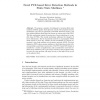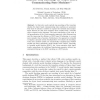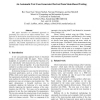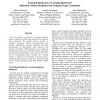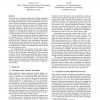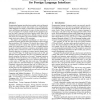WCE
2007
15 years 3 months ago
2007
—One problem of generating a model to recognize any string is how to generate one that is generalized enough to accept strings with similar patterns and, at the same time, is spe...
104
click to vote
WSC
2000
15 years 3 months ago
2000
One of the approaches to modeling hybrid systems is to assign algebraic-differential equations describing the continuous behavior to states of state machines that represent discre...
117
click to vote
PTS
2008
15 years 3 months ago
2008
We present in this paper a framework, RMOR, for monitoring the execution of C programs against state machines, expressed in a textual (nongraphical) format in files separate from t...
141
click to vote
ICISC
2008
15 years 3 months ago
2008
We propose a number of techniques for securing finite state machines (FSMs) against fault injection attacks. The proposed security mechanisms are based on physically unclonable fun...
199
click to vote
FMOODS
2008
15 years 3 months ago
2008
In this work, novel symbolic step encodings of the transition relation for object based communicating state machines are presented. This class of systems is tailored to capture the...
131
click to vote
FASE
2006
Springer
15 years 6 months ago
2006
Springer
Techniques for inferring a regular language, in the form of a finite automaton, from a sufficiently large sample of accepted and nonaccepted input words, have been employed to cons...
137
click to vote
APSEC
1998
IEEE
15 years 6 months ago
1998
IEEE
This paper describes an automated approach to generating test cases for an object-oriented class. The approach is derived from state-based testing methods and refers to a state ma...
230
click to vote
EH
1999
IEEE
1999
IEEE
Evolvable Hardware or Learning Hardware? Induction of State Machines from Temporal Logic Constraints
15 years 6 months ago
Here we advocate an approach to learning hardware based on induction of finite state machines from temporal logic constraints. The method involves training on examples, constraint...
120
click to vote
ICCAD
2000
IEEE
15 years 6 months ago
2000
IEEE
Most hardware description frameworks, whether schematic or textual, use cooperating finite state machines (CFSM) as the underlying abstraction. In the CFSM framework, a designer ...
108
click to vote
PLDI
2010
ACM
15 years 7 months ago
2010
ACM
Programming language specifications mandate static and dynamic analyses to preclude syntactic and semantic errors. Although individual languages are usually well-specified, comp...

